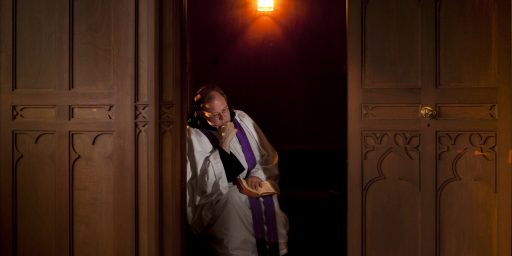CIA Counterterrorist Intelligence Centers
Dana Priest has a lengthy discussion of the CIA’s “secret” Counterterrorist Intelligence Centers (CTICs) and the relationship between counterterrorism, espionage, and diplomacy.
Foreign Network at Front of CIA’s Terror Fight (WaPo, A1)
The CIA has established joint operation centers in more than two dozen countries where U.S. and foreign intelligence officers work side by side to track and capture suspected terrorists and to destroy or penetrate their networks, according to current and former American and foreign intelligence officials. The secret Counterterrorist Intelligence Centers are financed mostly by the agency and employ some of the best espionage technology the CIA has to offer, including secure communications gear, computers linked to the CIA’s central databases, and access to highly classified intercepts once shared only with the nation’s closest Western allies. The Americans and their counterparts at the centers, known as CTICs, make daily decisions on when and how to apprehend suspects, whether to whisk them off to other countries for interrogation and detention, and how to disrupt al Qaeda’s logistical and financial support.
The network of centers reflects what has become the CIA’s central and most successful strategy in combating terrorism abroad: persuading and empowering foreign security services to help. Virtually every capture or killing of a suspected terrorist outside Iraq since the Sept. 11, 2001, attacks — more than 3,000 in all — was a result of foreign intelligence services’ work alongside the agency, the CIA deputy director of operations told a congressional committee in a closed-door session earlier this year.
The initial tip about where an al Qaeda figure is hiding may come from the CIA, but the actual operation to pick him up is usually organized by one of the joint centers and conducted by a local security service, with the CIA nowhere in sight. “The vast majority of successes involved our CTICs,” one former counterterrorism official said. “The boot that went through the door was foreign.”
The centers are also part of a fundamental, continuing shift in the CIA’s mission that began shortly after the 2001 attacks. No longer is the agency’s primary goal to recruit military attaches, diplomats and intelligence operatives to steal secrets from their own countries. Today’s CIA is desperately seeking ways to join forces with other governments it once reproached or ignored to undo a common enemy. George J. Tenet orchestrated the shift during his tenure as CIA director, working with the agency’s station chiefs abroad and officers in the Counterterrorist Center at headquarters to bring about an exponential deepening of intelligence ties worldwide after Sept. 11. Beneath the surface of visible diplomacy, the cooperative efforts, known as liaison relationships, are recasting U.S. dealings abroad.
I’ve certainly seen references to these CTICs before, although never such a lengthy discussion. Indeed, an advanced Google search reveals no previous mentions in the NYT or WaPo.
To the extent they are supposed to be “secret,” though, one wonders how Priest got enough information for a four (web) page article.
Conceptually, this is an obvious move. Given that virtually all terrorists are based outside the United States and most now operate independently of state sponsorship, the teaming with foreign governments is a natural. This also gives lie to the “we’re only fighting terrorism through military means” meme that simply refuses to die.





There is “secret,” “secret” and “secret.” If you catch my drift.
The centers are most likely secret not in the sense that any informed observer in any of those countries will not know of them, but in the sense that we try to keep details and operating procedures off the table.
Think Groom Lake. It was well known, certainly it’s existence couldn’t be hidden from anyone in that patch of desert, but there was no official confirmation of existence or role though much of that was known.
A lot of it is just to avoid reporting details. These pieces add up to larger puzzles when properly analyzed. Thus the outrage over the Plame affair, to let consrvatives decide which officers are to be revealed is a slippery slope. It is as bad as letting liberals decide.
And it has no redeeming purpose.
Revelation of such centers or prisons on the other hand can be argued to give Americans a view of large and important aspects of policy. The organization, methods of analysis and other features of these organizations start towards the slippery slope.
Incidently your claim that anyone serious, outside liveral equivalents of Rush, is argung that we are fighting the war only through military is another distortion which indicates the right does not take this conflict seriously.
The critique of Michael Scheuer, fallow, cClarke and others is that certain choices have shifted focus and resources including Arabic speakers from the greater dangers.
I don’t think you people can get it. We have vey serious often conservative critics of the war, the majority who questionn it once supported it and often voted for Bush.
They want answers and solutions. But you and your kind continue to distort the issues and arguments.
You simply do not believe the battle against terrorism is important.
“conservative”: I’m guessing you didn’t catch the Kerry campaign for president? Or Rep. Murtha’s speech yesterday? They’re not the Michael Moore wing of the party; they’re the mainstream.
I assume that Hastert and Frist have drafted their letter calling for an investigation into this leak of secret information. I mean their other call wasn’t just a political grandstand because it made the administration look bad, right?